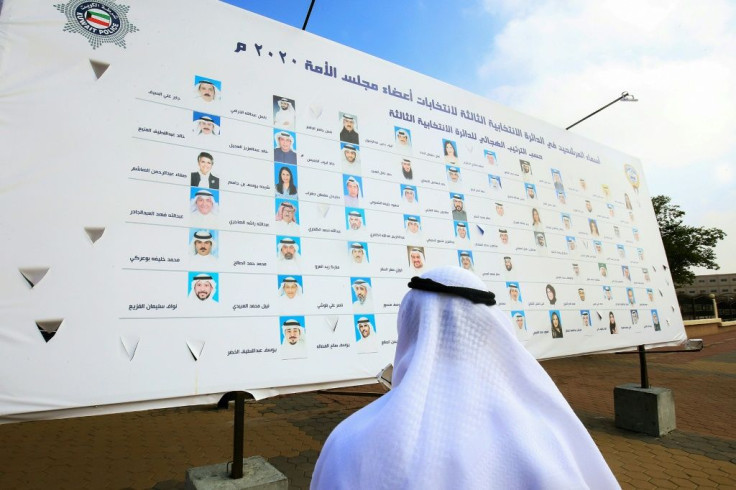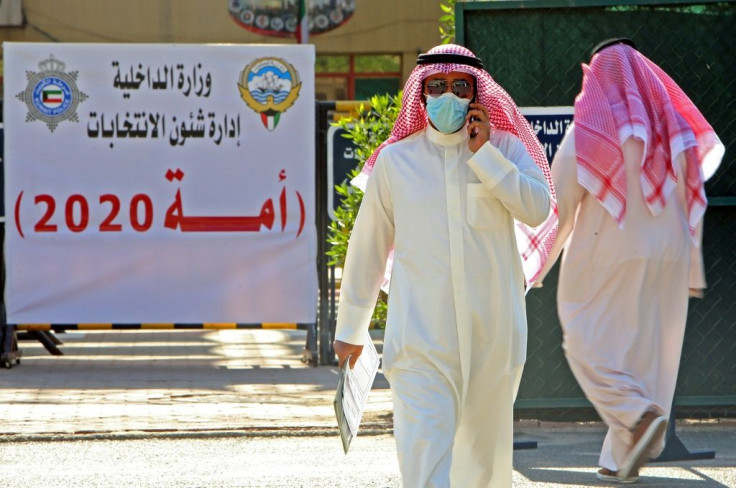In Kuwait, Lavish Election Campaign Events Off The Menu
Lavish banquets served in opulent marquees are nowhere to be seen this election season in oil-rich Kuwait, where the coronavirus pandemic has forced a ban on traditional over-the-top campaign events.
Lambs on spits, mountains of rice, and platters of sweets usually attract hordes of potential voters to campaign events in the small Gulf state, which holds parliamentary elections on Saturday.
Unlike its more authoritarian neighbours, Kuwait has a dynamic political life with an active parliament that doesn't hesitate to take the government to task. Its election campaigns are equally lively -- in normal years.
In elections past, Fahd Mohammed Al-Moutairi used to organise feasts for half a dozen candidates, all aiming to impress voters with their generosity, in his restaurant "Tayba", located north of the capital Kuwait City.
"We usually prepare grilled lamb and rice for dinners during the campaign that can run for up to two months. But the coronavirus blew it all away," he told AFP.
The loss of business is another blow to restaurateurs who suffered during months of lockdown to stem the spread of the virus in Kuwait, which has registered more than 142,000 infections and nearly 900 deaths.

Campaign events can cost between 3,000 and 7,000 Kuwaiti dinars (about $10,000-23,000), and draw as many 2,000 guests in the country's tribal regions, according to the Kuwaiti Federation of Restaurants.
Along with restaurants, companies that organise banquets under large tents, serving coffee and dates to voters, will be the big losers in this campaign, said the association's director, Fahd al-Arbach.
"This period is usually the main driver of their business in normal times," he told AFP.
The weekend elections are the first since the new Emir, Sheikh Nawaf Al-Ahmad Al-Sabah, took office on September 29 following the death of his half-brother, 91-year-old Sheikh Sabah al-Ahmad Al-Sabah.
But with the opposition weakened in recent years, no major political shifts are expected. A few electoral banners dotted through the streets are the only reminder of the nation's political calendar.

Instead, this year's campaign is mainly being fought on social networks and in the media.
Tweets, Snapchat videos, Instagram "lives" and electoral meetings via Zoom have taken the place of traditional campaigning, and candidates are pumping the money saved on catering into virtual campaigns.
The cost of advertising has shot up as a result, said Faysal Al-Sawagh, head of the Kuwaiti Federation of Electronic Media.
"Kuwaitis are using social networks to make their voices heard and hear ideas from the candidates," he told AFP.
The usual themes of election campaigns are a constant though, from promises to fight corruption and plans for youth employment to freedom of expression, housing, education and the thorny issue of the "bidoon", Kuwait's stateless minority.
The frugality imposed by the health crisis has saved politicians a fortune, considering the average expense of fighting an election campaign can reach 100,000 Kuwaiti dinars (about $327,000), said one contender, Ali Al-Ali.
"Spending has increased on electronic and traditional media instead," the young lawyer told AFP.
"These unusual circumstances are giving young candidates a better chance of winning, as they have already linked with voters in the past few years through social networks," he said.
Another candidate, Sheikha Al-Jassem, is also pleased to have reduced her costs by not having to host the elaborate dinners that politicians would normally throw a couple of times a week in the lead-up to the vote.
The philosophy professor, who is campaigning on a platform of defending women's rights, told AFP she is redoubling her efforts to promote herself on Twitter and Instagram.
"This time, social networks have become the battleground of the parliamentary elections," she said.
© Copyright AFP 2024. All rights reserved.



















